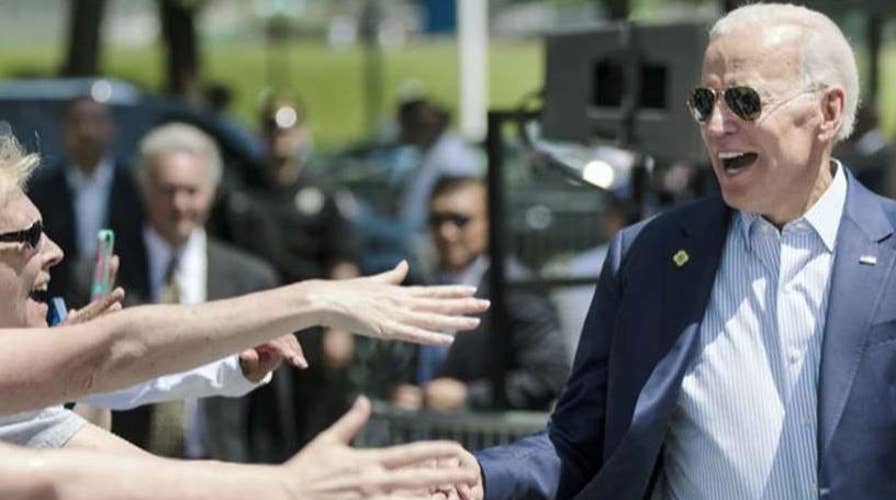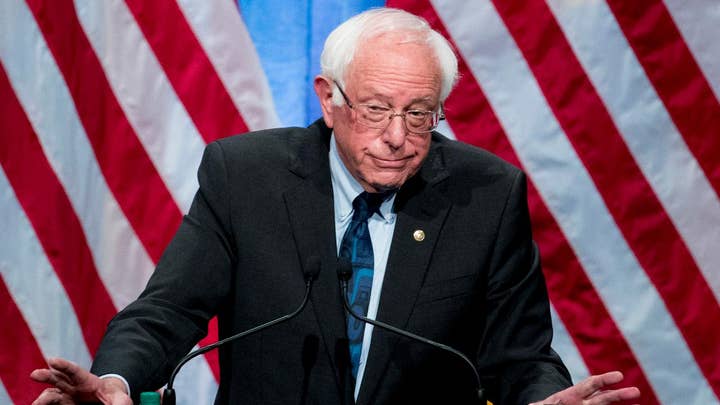What are the match-ups to watch during the first Democratic debate?
Campaign strategist John Thomas on the candidates who qualified for the first Democratic debate.
Get ready for a political fistfight at the first Democratic debates.
Front-runners Joe Biden and Bernie Sanders will end up sharing the debate stage in Miami later this month, along with heavy-hitting rivals Kamala Harris and Pete Buttigieg, according to the line-up announced Friday.
The first debate of the Democratic primary season will be split into two nights given the size of the field. But despite apparent efforts to avoid the impression of the event being divided into a main event and 'kids' table,' the final line-up ends up putting most high-polling candidates on the stage on the second night.
Former Vice President Biden, Sens. Sanders, I-Vt., and Harris, D-Calif., and South Bend Mayor Buttigieg are four of the five highest-polling candidates in recent national and early-voting state polling. The fifth, Sen. Elizabeth Warren, D-Mass., will appear on stage with another crowd of candidates the first night.
But the roster could make for some serious fireworks on the second night, as Sanders -- who’s making his second straight White House run -- has increasingly criticized Biden, the clear front-runner right now at this early point in the Democratic nomination race.
BIDEN HITS BACK AT SANDERS REPEATED CRITICISM
Sanders and his campaign have repeatedly blasted Biden for holding top-dollar fundraisers, with the candidate indirectly slamming the former vice president for attending a “fundraiser hosted by a corporate CEO on the Las Vegas strip.”
And Sanders' campaign spotlighted that Biden was rubbing elbows with “high-dollar functions hosted and attended by corporate lobbyists.” Sanders has also come under attack from some of his rivals recently, for his public embrace of democratic socialism and big-government policies.
The Democratic National Committee will have 10 candidates on stage on consecutive nights, June 26-27, in Miami. NBC, the DNC’s media partner for the first round of debates, announced the line-ups after holding a lottery-type event at Rockefeller Center in New York City.
Joining Biden and Sanders will be Harris and Buttigieg, a one-time long-shot for the nomination who’s surged in recent months. Buttigieg has also indirectly questioned Biden over his age.
Also joining are Sens. Kirsten Gillibrand of New York and Michael Bennet of Colorado, former Colorado Gov. John Hickenlooper, Rep. Eric Swalwell of California, entrepreneur Andrew Yang and best-selling spiritual author Marianne Williamson.
Warren, whose poll numbers have jumped in recent weeks, will be the highest-polling candidate on the first night -- which could help her raise her profile even further, but also denies her the opportunity to take on the front-runners directly.
Joining her will be Sens. Cory Booker of New Jersey and Amy Klobuchar of Minnesota, former Rep. Beto O’Rourke of Texas, Washington state Gov. Jay Inslee, former Housing and Urban Development secretary and former San Antonio Mayor Julian Castro, Reps. Tulsi Gabbard of Hawaii and Tim Ryan of Ohio, former Rep. John Delaney of Maryland and New York City Mayor Bill de Blasio.
NBC divided the 20 contenders who qualified for the first two rounds of DNC debates into two groups – those polling at 2 percent or higher, and those under 2 percent. Through a random selection, the upper and lower tier groups were split between the two nights of debate.
They divvied up the upper- and lower-tier candidates to avoid the format used during the 2016 GOP presidential primaries, when the large field of nearly 20 candidates was divided into two groups, with the higher-polling candidates facing off against each other, and a smaller group of lower- polling candidates placed in what was derided as the “kids' table.” But through the random selection, most of the highest-polling candidates will still appear on one night.
WHICH 2020 DEMOCRATS WON'T MAKE THE DEBATE STAGE
The DNC on Thursday announced the 20 candidates that had qualified. The thresholds for the first two rounds of debates – the second round will be held in late July in Detroit – were announced by the DNC in January. They include reaching 1 percent in three polls recognized by the national party committee, or receiving contributions from a minimum 65,000 unique donors as well as 200 unique donors in at least 20 states
Failing to qualify were Gov. Steve Bullock of Montana; Rep. Seth Moulton of Massachusetts; and Miramar, Fla., Mayor Wayne Messam.
Since jumping into the race in late April, Biden’s increasingly taken incoming fire from Sanders, Warren, and just this week, from O’Rourke, who argued “we cannot return to the past. We cannot simply be about defeating Donald Trump."
O'ROURKE TARGETS BIDEN FOR BEING A 'RETURN TO THE PAST'
Biden’s been criticized for his past support of free trade deals, for his 2002 vote in support of the Iraq War, and for taking an alleged “middle ground” approach to combating climate change.
Asked if he would return fire, Biden last week told Fox News: “I think the worst thing we could do is get into a match where we’re going after each other in the Democratic Party. So I’m going to try my best not to be negative relative to my opponents.”
And pointing to Republican President Trump, he emphasized that “just like I’m not going to go down to Trump’s level when he starts his attacks, I’m not going to go down to anybody else’s level when they start attacks.”
But Biden said he would respond at times to “set the facts straight.” He added, “I’ll respond to assertions. I’m not likely to go and point out what they’re doing, which is sometimes different than what they say.”














































